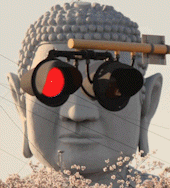| Hot Topics | |
|---|---|
"Rental sister" for hikikomori only $8,000/year!
7 posts
• Page 1 of 1
"Rental sister" for hikikomori only $8,000/year!
_________
FUCK THE 2020 OLYMPICS!
FUCK THE 2020 OLYMPICS!
-

Taro Toporific - Posts: 10021532
- Images: 0
- Joined: Tue Sep 10, 2002 2:02 pm
I'm usually one of the first ones to make jokes about this kind of stuff, but I read the entire article, and I have to say, this is a serious problem. Or, at the very least, I can believe all the information they're giving us. The 1 million figure may be a bit iffy -- but if it IS true, then that's truly a major problem.
Everything checks out, though, especially with the hierarchy and attitude of japanese high school students. And I bet most of the mothers are trying to ignore their hikikomori sons, figuring "Oh, it's probably a phase, they'll grow out of it in the end," and fathers are too busy with work/disgusted with their sons that they just don't care.
Then one year turns into two, two into three...and it becomes just another way of life.
I'm not saying hikikomori is a problem that we should sympathize with. Most of these kids are probably just whiny children who have been babied too much by their parents. The fact remains, though -- it IS a problem, whether it's a meritable one or not. I want to say it's a product of society, but I can't be too sure. Are today's japanese children's outlooks on the world influenced by society? Or are they born with these selfish, easy-way-out mentalities? It's hard to say. I can't answer the question myself.
Everything checks out, though, especially with the hierarchy and attitude of japanese high school students. And I bet most of the mothers are trying to ignore their hikikomori sons, figuring "Oh, it's probably a phase, they'll grow out of it in the end," and fathers are too busy with work/disgusted with their sons that they just don't care.
Then one year turns into two, two into three...and it becomes just another way of life.
I'm not saying hikikomori is a problem that we should sympathize with. Most of these kids are probably just whiny children who have been babied too much by their parents. The fact remains, though -- it IS a problem, whether it's a meritable one or not. I want to say it's a product of society, but I can't be too sure. Are today's japanese children's outlooks on the world influenced by society? Or are they born with these selfish, easy-way-out mentalities? It's hard to say. I can't answer the question myself.
-

Molokidan - Posts: 240
- Joined: Thu Nov 20, 2003 2:14 pm
If it is really 1 million, that's a little under 1% of the population of Japan... Almost 1 out of every 150 people would be like this. So, I'm kind of doubting the figures, but sad story nonetheless.
Why do the Japanese always have to have a favorite saying?
- puargs
- Maezumo
- Posts: 225
- Joined: Tue Jun 22, 2004 6:04 pm
Mmmm
Good find Taro-san. Nice to see them starting to face the issue.
For more on this topic (and my very bad oyaji gyagu) see also the thread - Hikikomori
For more on this topic (and my very bad oyaji gyagu) see also the thread - Hikikomori
- "This is the verdict: . . . " (John 3:19-21)
- "It could be that the purpose of your life is only to serve as a warning to others" (Anon)
-

kurohinge1 - Maezumo
- Posts: 2745
- Joined: Fri Apr 11, 2003 12:52 pm
- Location: Sydney, Australia
Woah what a well written article. Regardless it that number is true it is still a problem. This article made it easy to see where the problem starts, really sad actually
-

ichigo partygirl - Posts: 1521
- Joined: Sun Jan 16, 2005 5:35 pm
- Location: Sydney, Australia
NY Times cover hikkikomori
The NY Times covers Japanese hikkikomori.
Like Takeshi and Shuichi, Y.S. suffered from a problem known in Japan as hikikomori, which translates as "withdrawal" and refers to a person sequestered in his room for six months or longer with no social life beyond his home. (The word is a noun that describes both the problem and the person suffering from it and is also an adjective, like "alcoholic.") Some hikikomori do occasionally emerge from their rooms for meals with their parents, late-night runs to convenience stores or, in Takeshi's case, once-a-month trips to buy CD's. And though female hikikomori exist and may be undercounted, experts estimate that about 80 percent of the hikikomori are male, some as young as 13 or 14 and some who live in their rooms for 15 years or more.
South Korea and Taiwan have reported a scattering of hikikomori, and isolated cases may have always existed in Japan. But only in the last decade and only in Japan has hikikomori become a social phenomenon. Like anorexia, which has been largely limited to Western cultures, hikikomori is a culturebound syndrome that thrives in one particular country during a particular moment in its history.
http://www.nytimes.com/2006/01/15/magazine/15japanese.html?ex=1294981200&en=7a1fdac3eb790b32&ei=5090&partner=rssuserland&emc=rss
Like Takeshi and Shuichi, Y.S. suffered from a problem known in Japan as hikikomori, which translates as "withdrawal" and refers to a person sequestered in his room for six months or longer with no social life beyond his home. (The word is a noun that describes both the problem and the person suffering from it and is also an adjective, like "alcoholic.") Some hikikomori do occasionally emerge from their rooms for meals with their parents, late-night runs to convenience stores or, in Takeshi's case, once-a-month trips to buy CD's. And though female hikikomori exist and may be undercounted, experts estimate that about 80 percent of the hikikomori are male, some as young as 13 or 14 and some who live in their rooms for 15 years or more.
South Korea and Taiwan have reported a scattering of hikikomori, and isolated cases may have always existed in Japan. But only in the last decade and only in Japan has hikikomori become a social phenomenon. Like anorexia, which has been largely limited to Western cultures, hikikomori is a culturebound syndrome that thrives in one particular country during a particular moment in its history.
http://www.nytimes.com/2006/01/15/magazine/15japanese.html?ex=1294981200&en=7a1fdac3eb790b32&ei=5090&partner=rssuserland&emc=rss
- gkanai
- Maezumo
- Posts: 582
- Joined: Sun Dec 22, 2002 6:59 pm
7 posts
• Page 1 of 1
Who is online
Users browsing this forum: Baidu [Spider] and 78 guests

